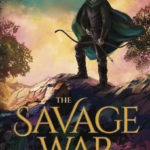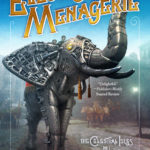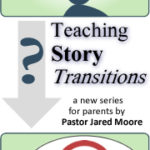Christ In Fantasy And Science Fiction
I read a particularly interesting post at Sci Fi & Fantasy Lovin’ Blog discussing Christ figures in science fiction. Note this paragraph in particular:
So I guess I’m just wondering why. Why is it that science fiction, that is often supposed to be more about the rational mind, falls back on our religious superstitions? Is it simply that the creators of our favorite fiction find themselves going back to their childhood traditions? Even unconsciously? Or is science simply not enough to fill our need to know why we are here?
Well, I’m glad you asked! 😉
Blaise Pascal, the 17th Century French mathematician, philosopher and physicist, suggested that there is a need in Man’s heart for God:
What else does this craving, and this helplessness, proclaim but that there was once in man a true happiness, of which all that now remains is the empty print and trace? This he tries in vain to fill with everything around him, seeking in things that are not there the help he cannot find in those that are, though none can help, since this infinite abyss can be filled only with an infinite and immutable object; in other words by God himself. [Pascal, Pensees #425]
The Bible makes it clear that God shows Himself through what He has made.
That which is known about God is evident within them; for God made it evident to them. For since the creation of the world His invisible attributes, His eternal power and divine nature, have been clearly seen, being understood through what has been made …
-Romans 1:19, 20
I’ve always understood the “through what has been made” part as mountains and stars and photosynthesis—the natural world, in other words. But He also made Man, and something in us also shows God. More than the other stuff, actually, because Genesis says we are made in His image.
What does any of this have to do with Christ figures in science fiction and fantasy? I suggest the presence of Messiah figures is indicative of this part of Mankind made to reflect God. We long for a True Hero, someone so self-sacrificing, so good, so fair, so accepting that we feel completely safe—and so empowered—because we were made for relationship with the Ultimate Hero.
Putting him in our fiction shows what we want in our lives. Some authors do so because they long for what they haven’t experienced and some do so to demonstrate what they already enjoy.
Another blogger, John Brownlee, commented over at SciFi Scanner on this tendency to include a Christ figure in speculative fiction, attributing it to Christianity’s influence on the culture. However, he doesn’t view the inclusion of Messianic characters in a positive light:
These characters are all united in a positively maudlin over-usage of ham-handed Christian symbolism. Their comings were usually foretold in ponderous, badly written “prophesies.” They all have supernatural powers that allow them to perform miracles. And so on.
In other words, he is saying there is nothing “fresh” about stories containing Christ figures (though he later postulates that Christ in outer space fighting against an alien might be interesting).
This statement raises a question—does a story with a Christ figure of necessity have to seem derivative?
If you read J. K. Rowling’s comments about her faith, you’ll find that she purposefully downplayed her Christianity because she thought her worldview would give away the culminating plot points of Harry Potter and the Deathly Hallows and spoil the surprise.
How does a Christian writer avoid “maudlin over-usage of ham-handed Christian symbolism”? (And what IS “ham-handed” symbolism? 😮 )
Your thoughts?
This article is a reworking of two posts that appeared at A Christian Worldview of Fiction in November, 2007








































I am often amused by people who believe science answers the question of why. Science can only tell how some state of affairs has come to pass. It can not tell why it has come to pass. Both “how” and “why” deal with causality; however, only “why” deals with an intelligent or purposeful cause. Science deals with the “how” question quite well. Theology and Philosophy deal with the “why” question. These disciplines can deal with the “why” question with a good deal of rationality I might add. As a matter of fact, it is Naturalist Philosophy that considers the disciplines of Theology and Philosophy as irrational; thus, the Naturalist cuts off a good deal of Epistemological support for his own position. The Naturalist, in order to claim rationality for himself, must cheat by stealing rationality from disciplines that he considers irrational.
I think creation science deals with the ‘whys’ and ‘hows’ very well but secular science is clueless. They can only observe the ‘now’ with any decent perspective. Evolution is the greatest fairytale of all time. It’s not only not scientific, it’s religious. False religion at that.
My wife is a scientist and had to unlearn almost everything they taught her in college. It’s sad that our schools are so anti-Christ even though the latest polls show most people don’t buy into evolution.
Good article Rebecca
I never thought about what kinds of questions the different disciplines answer. Wow! That’s insightful, Royce.
I’m not sure “how” deals with causality, though. It seems more procedural, not motivational.
And yes, Theology and Philosophy do deal with the why question in a rational way.
I love your closing line—stealing rationality from disciplines that he considers irrational. Excellent!
Becky
Messiah hero. There is a massive confusion here today. My understanding of this was jogged by several incidents. An old issue of Zadok Perspectives had an article proposing Ned Kelly as a type of Australian Christ figure. I watched the Matrix movies. In an old isue of the Canadian Dreams and Visions I saw an ad for a poster of “the warrior Christ”. It basically had a red faced warrior with a mohawk haircut. Then I heard Obama refered to as a messiah hero.
The original idea of the messiah seems to have been some warrior leader who would free his people and kill their enemies. This is what many people were expecting of Jesus. He disappointed them. He didn’t seem to be capable of killing any enemies or overthrowing any oppressors. All he could manage was to transform his followers. This transformed the idea of messiah into something different to hero. Here’s how to tell the difference.
A hero kills to save his people.
A messiah dies to save his people.
Ever since Jesus, anyone who claims to be a messiah and kills is a fake.
It is surprising how many people are still unable to disentangle these ideas. How persistent is the idea of a pwerful, possibly superhuman, killing machine hero come to save us all by defeating our enemies. That’s one excellent way of botching up any kind of Christian symbolism.
Even many Christians may overdose on the idea that Jesus came to defeat the Devil. He did, but as a corollary. As you said, Ken, His main goal was to die to save rebellious us. And to that I would add that the true Messiah doesn’t die to save His people from enemies, but to save His enemies themselves.
Ken, yes, some of those parallels are definitely pushing it but I think The Matrix reflects something of the nature of a messiah-figure, Gnositic/Buddhist content not withstanding. Still, Jesus is the one true Messiah and stories show reflections of this truth (some more than others).
“Jesus is the one true Messiah and stories show reflections of this truth (some more than others).”
Some examples would be useful. I don’t see a lot of fictional works like this. In fact, the only recent one I can think of while sitting here is the film Gran Torino. Moviemakers more than writers are in love with gunplay. Any time you see that rain of glittering brass shell casings bouncing with metallic kachings on the ground you are not in the presence of a Jesus style messiah. Maybe that’s because in general movies have to show things, which is why I prefer reading books.